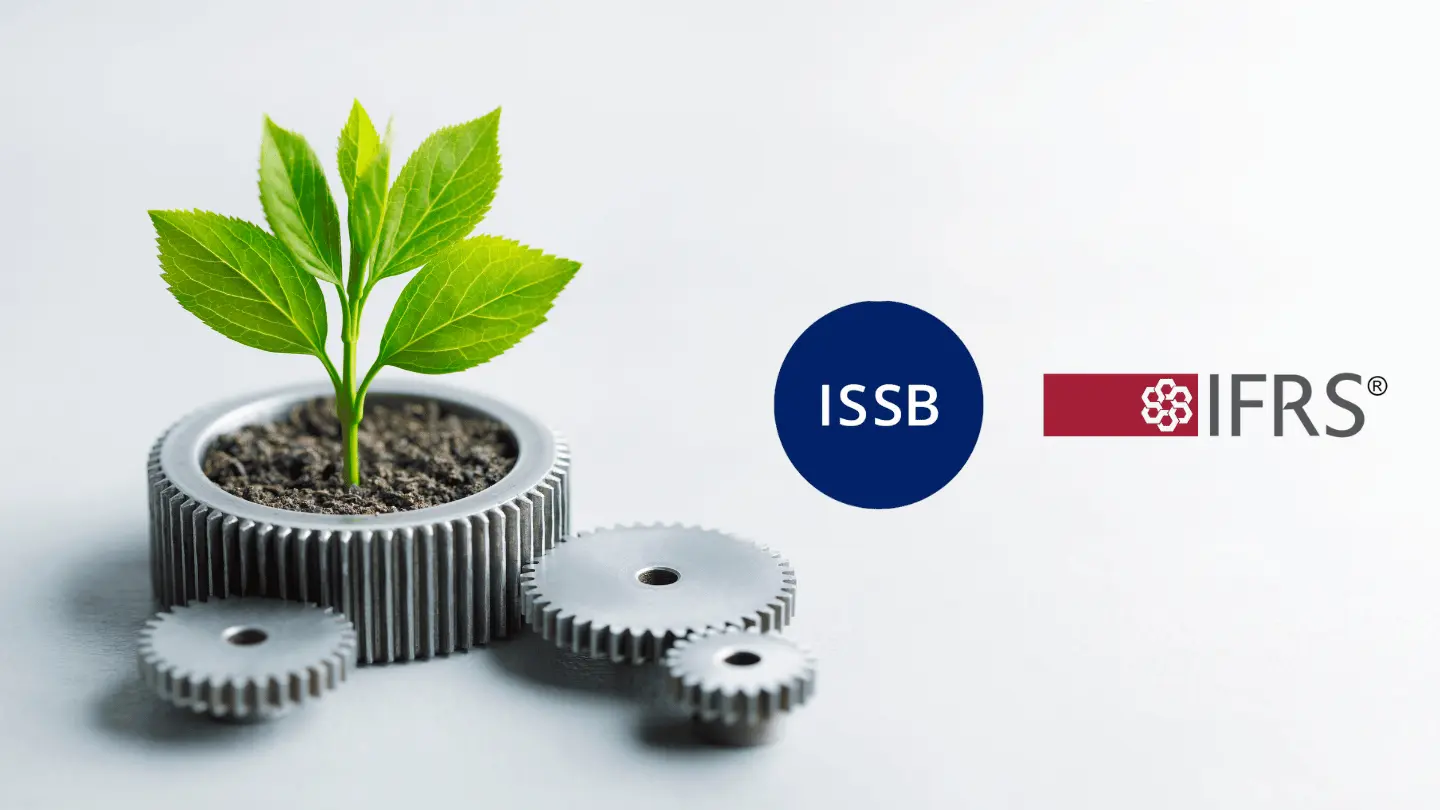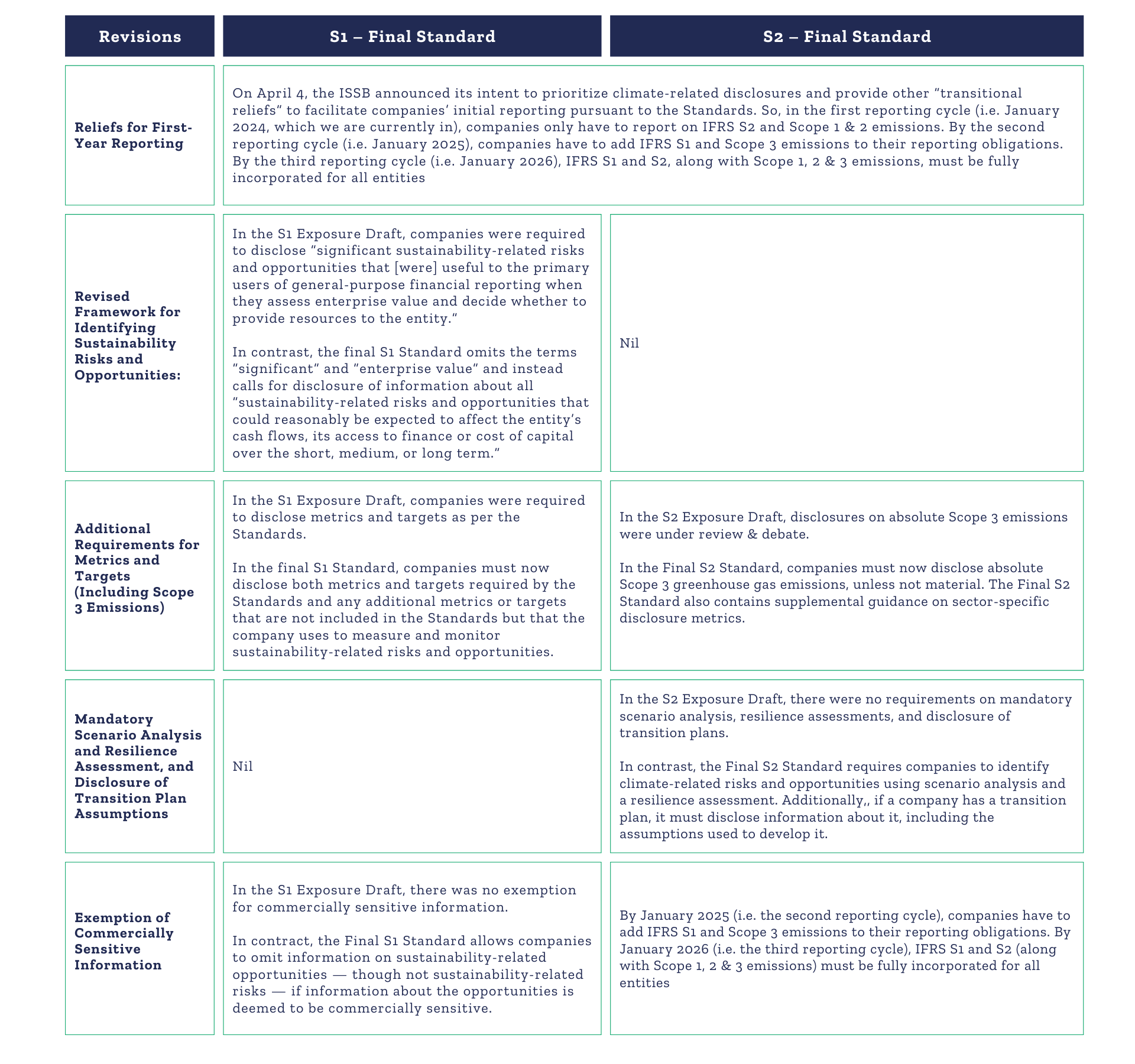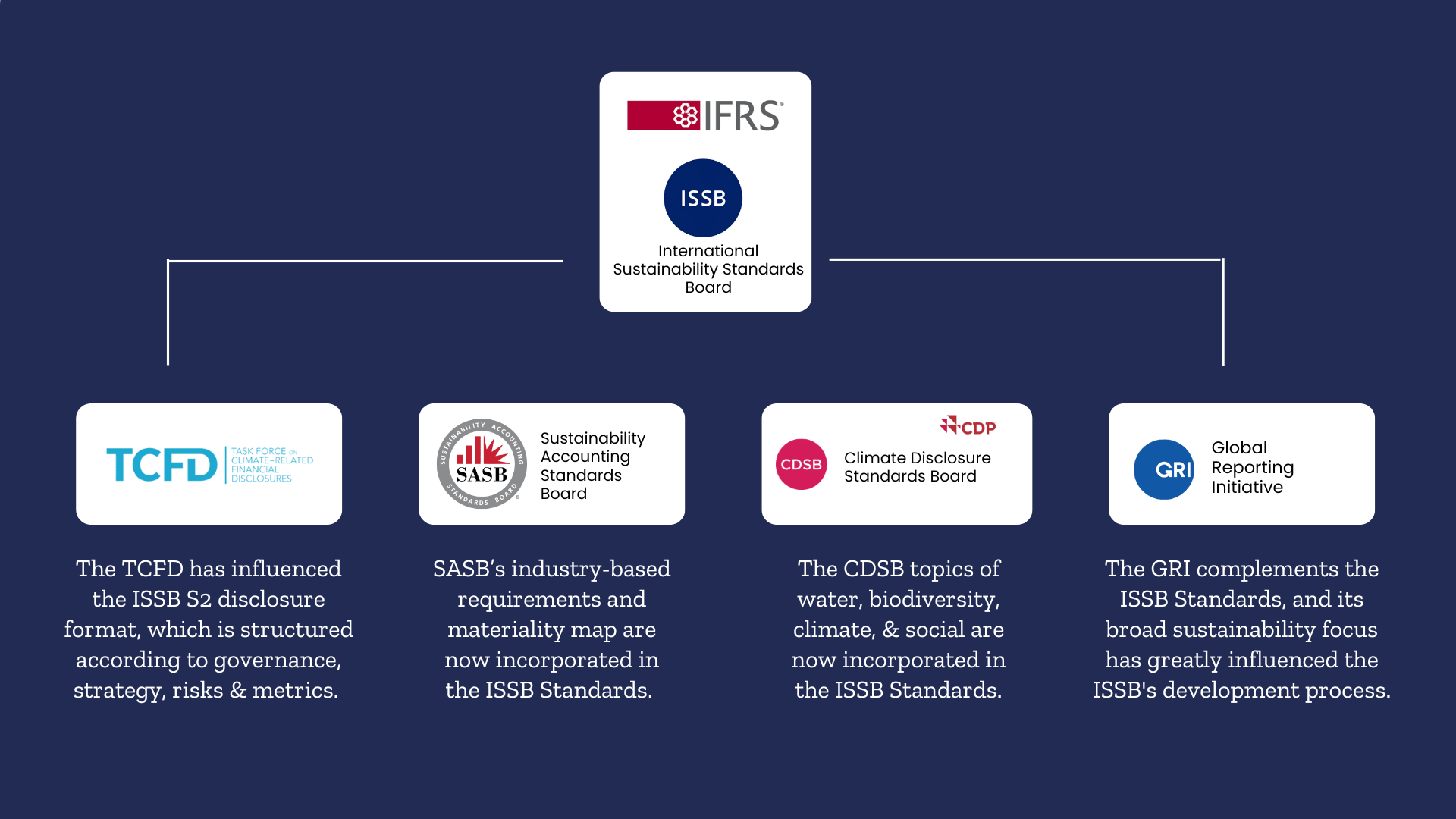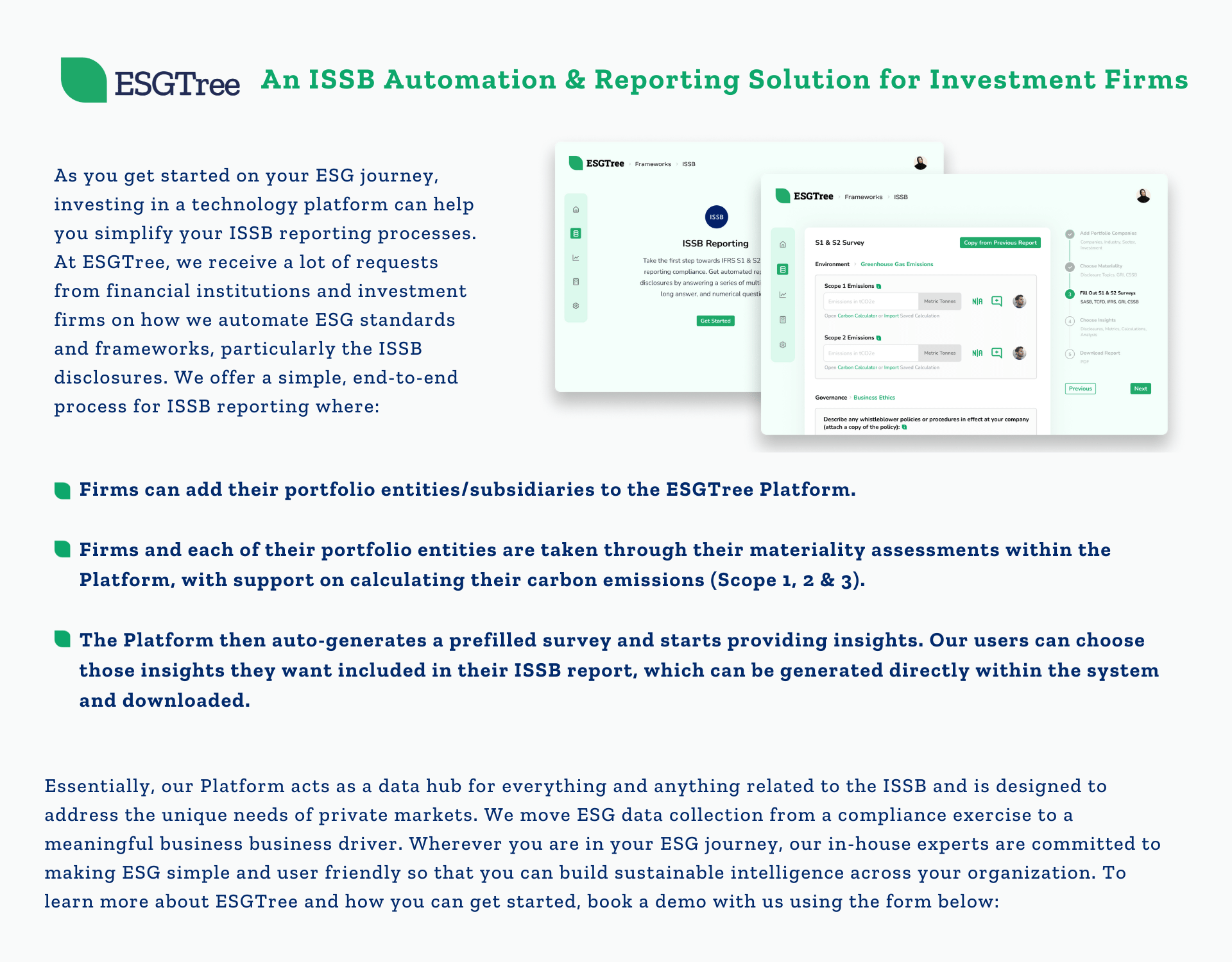The IFRS S1 and S2 Standards: What’s New & What’s to Come?
Share:

Table of Contents
On 26th June, 2023, the ISSB finally launched its inaugural sustainability standards, ushering in a new era in international corporate reporting
The The International Sustainability Standards Board (ISSB) has issued its first two IFRS Sustainability Disclosure Standards: the IFRS S1 General Requirements for Disclosure of Sustainability-related Financial Information and IFRS S2 Climate-related Disclosures. Both standards fully incorporate the 4 pillars of the Task Force on Climate-related Financial Disclosures (TCFD) as well as the Sustainability Accounting Standards Board (SASB) Standards; both are now subsumed under the ISSB as part of the efforts to establish a global baseline for sustainability reporting.
In this article, we highlight the key changes in the final S1 & S2 standards since the 2022 drafts, explore the implications of the Standards on voluntary & mandatory reporting, and discuss the things to expect from the ISSB in the future. For a more general overview & introduction to the ISSB Standards, click here.
The IFRS S1 and IFRS S2: What’s New?
The final Standards incorporate feedback from more than 1,400 global stakeholders and contain several notable changes from the 2022 drafts (see Table 1 below):

Despite these changes, the Standards continue to lean heavily on industry-specific disclosure topics issued by the SASB and strongly align with the European Sustainability Reporting Standards (ESRS), Global Reporting Initiative (GRI), the Greenhouse Gas Protocol, and many more (see Figure 1 below).

Potential Impact of S1 & S2 on Voluntary & Mandatory Reporting Regimes
The fact that 1) an advisory group of prominent asset managers from around the world helped the ISSB develop its Standards, 2) influential sustainability reporting organizations like the Principles for Responsible Investment (PRI) are advocating for governments and companies to adopt ISSB-aligned reporting, and 3) the CDP’s 2024 corporate questionnaire aligns with the IFRS S2, indicates that the Standards are already shaping investor expectations and global corporate sustainability reporting.
In fact, 20 + jurisdictions (including Canada, the UK, Australia, New Zealand, China, & Japan) are already engaged in the adoption process, and a snowball effect is now in occurring, especially since the International Organizations of Securities Commissions (IOSCO) approved the final Standards. This alone marks a breakthrough for the ISSB Standards, transforming their very nature from Voluntary to Mandatory.
What’s Next for the ISSB?
Additional Standards Forthcoming
As of 2024, the ISSB has moved forward with research projects on two key areas: biodiversity, ecosystems (including ecosystem services), and human capital. These projects were initiated based on the ISSB’s consultation on future priorities and aim to assess how risks and opportunities in these areas impact companies and investors. The ISSB is looking to build on existing frameworks, such as those from the SASB and TNFD (Taskforce on Nature-related Financial Disclosures), to develop more specific disclosure standards within these areas.
For the next two years, the ISSB’s focus will be on developing these research projects, enhancing the SASB Standards, and (most importantly) supporting the implementation of the IFRS S1 and IFRS S2.
Challenges to Adoption & Implementation
While the shift towards Scope 3 reporting and greater climate change disclosure can improve transparency and offer investors more data to make informed decisions, companies will face infrastructural challenges to meet the Standards’ requirements. For instance, companies/financial institutions will have to conduct a substantial amount of first-time data collection in order to comply with ISSB’s data requirements. To do this successfully, they will need to radically shift & revolutionize the way their sustainability data is collected and reported on.
The good news is that the ISSB has introduced training programmes to support those applying its Standards and has provided “transitional reliefs” to facilitate initial reporting. For specific details on reliefs & adoption timeline, refer “Reliefs for First-Year Reporting” in Table 1 above. While such concessions will ease the reporting burden on many companies, smoothen the transition period, and encourage compliance, companies will still struggle with data gathering, verification, and technical compliance requirements. For companies looking to start their ISSB reporting today, it us essential for them to deploy mitigation strategies that will gear them up for the January 2024 reporting period.
While the adoption of IFRS S1 and S2 may have seemed like a long-shot when they were first introduced, it is clear that they are here and ready to be reported on. In fact, we are currently in the first reporting cycle for the IFRS S1, but there’s a lot of legwork involved in setting up internal reporting capacity. So, early adoption and early assessments are really crucial for setting up that internal capacity in the face of upcoming regulations.

Why ESGTree? – Differences that Make a Difference
Who Should the Economy Really Serve?
What We’ve Learned Automating the ESG Data Convergence Initiative (EDCI) for Clients
What Does the Rise of ESG Mean for Impact Investing?
Summary
Share:
The IFRS S1 and IFRS S2: What’s New?
Potential Impact of S1 & S2 on Voluntary & Mandatory Reporting Regimes
What’s Next for the ISSB?
Challenges to Adoption & Implementation
About ESGTree: Simplifying Sustainability Reporting
Contact Us
Contact Us
Office Addresses
Canada: ESGTree, CPA 4th Floor, 140 West mount Rd N, Waterloo,
ON N2L 3G6, Canada
United Kingdom: ESGTree, 33 Queen Street, London EC4R 1AP, United Kingdom




